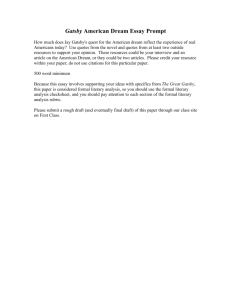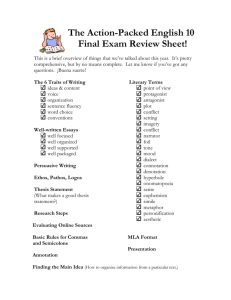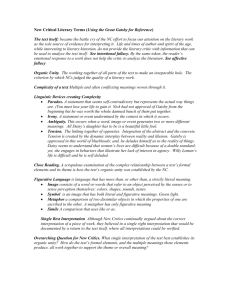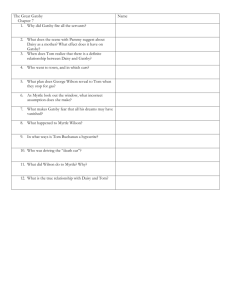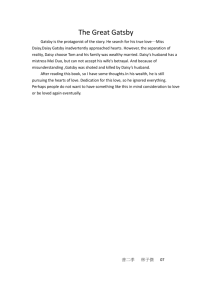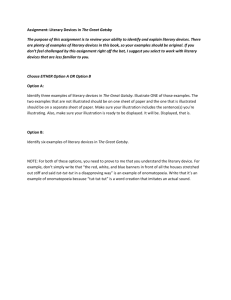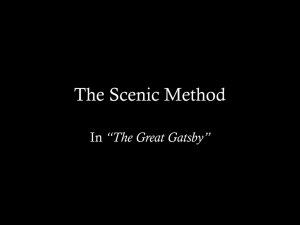English II Practice Final Exam Name: Date:______ Literature: 30
advertisement
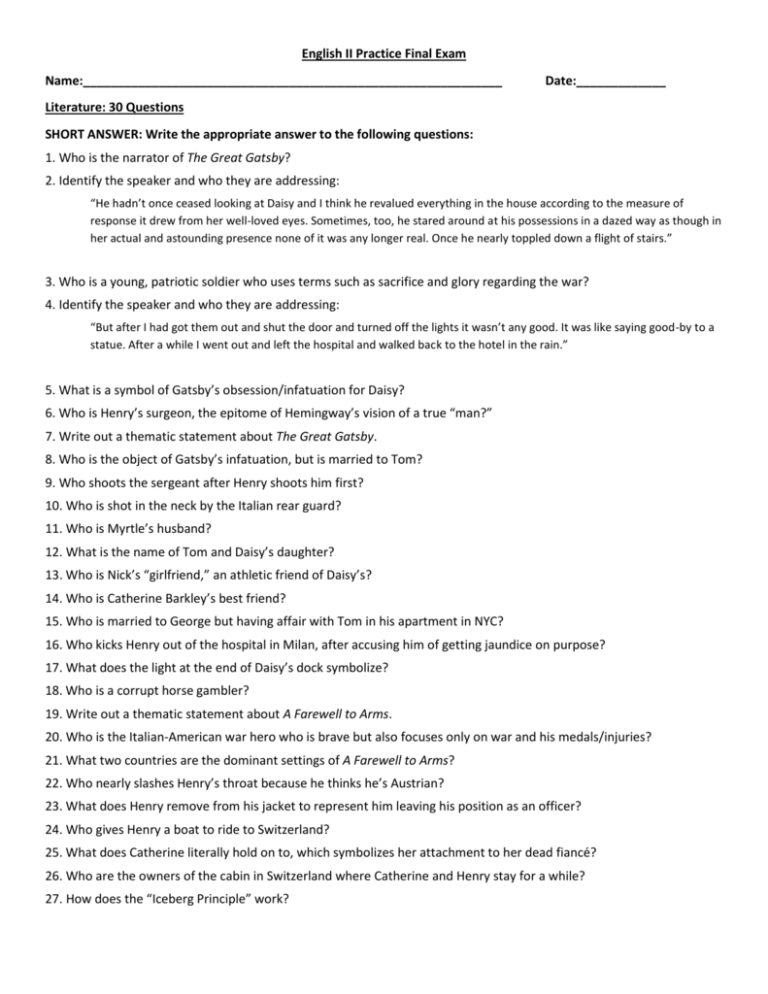
English II Practice Final Exam Name:_____________________________________________________________ Date:_____________ Literature: 30 Questions SHORT ANSWER: Write the appropriate answer to the following questions: 1. Who is the narrator of The Great Gatsby? 2. Identify the speaker and who they are addressing: “He hadn’t once ceased looking at Daisy and I think he revalued everything in the house according to the measure of response it drew from her well-loved eyes. Sometimes, too, he stared around at his possessions in a dazed way as though in her actual and astounding presence none of it was any longer real. Once he nearly toppled down a flight of stairs.” 3. Who is a young, patriotic soldier who uses terms such as sacrifice and glory regarding the war? 4. Identify the speaker and who they are addressing: “But after I had got them out and shut the door and turned off the lights it wasn’t any good. It was like saying good-by to a statue. After a while I went out and left the hospital and walked back to the hotel in the rain.” 5. What is a symbol of Gatsby’s obsession/infatuation for Daisy? 6. Who is Henry’s surgeon, the epitome of Hemingway’s vision of a true “man?” 7. Write out a thematic statement about The Great Gatsby. 8. Who is the object of Gatsby’s infatuation, but is married to Tom? 9. Who shoots the sergeant after Henry shoots him first? 10. Who is shot in the neck by the Italian rear guard? 11. Who is Myrtle’s husband? 12. What is the name of Tom and Daisy’s daughter? 13. Who is Nick’s “girlfriend,” an athletic friend of Daisy’s? 14. Who is Catherine Barkley’s best friend? 15. Who is married to George but having affair with Tom in his apartment in NYC? 16. Who kicks Henry out of the hospital in Milan, after accusing him of getting jaundice on purpose? 17. What does the light at the end of Daisy’s dock symbolize? 18. Who is a corrupt horse gambler? 19. Write out a thematic statement about A Farewell to Arms. 20. Who is the Italian-American war hero who is brave but also focuses only on war and his medals/injuries? 21. What two countries are the dominant settings of A Farewell to Arms? 22. Who nearly slashes Henry’s throat because he thinks he’s Austrian? 23. What does Henry remove from his jacket to represent him leaving his position as an officer? 24. Who gives Henry a boat to ride to Switzerland? 25. What does Catherine literally hold on to, which symbolizes her attachment to her dead fiancé? 26. Who are the owners of the cabin in Switzerland where Catherine and Henry stay for a while? 27. How does the “Iceberg Principle” work? 28. What is the “Lost Generation?” 29. What symbolizes misery and death in A Farewell to Arms? 30. What looks out over the valley of ashes, and represents the omniscience of God? Literary Terms: 30 Questions A. B. C. D. E. F. G. Diction Imagery Metaphor Simile Allegory Characterization Theme H. I. J. K. L. M. N. Symbolism Setting Personification Repetition Irony Frame story Dialect O. P. Q. R. S. T. U. Flashback Iceberg Principle Propaganda Euphemism Idiom Pun Foreshadowing V. Plot W. Exposition X. Conflict Y. Climax Z. Resolution AA. Allusion BB. Oxymoron CC. 1st Person POV DD. 2nd Person POV EE. 3rd Person POV ____31. When a writer leaves out some information, yet the reader is still able to sense that information as if the writer had actually written it ____32. The general locale, historical time, and social circumstances in which the action of a fictional or dramatic work occurs. ____33. A central idea or statement that unifies and controls an entire literary work. ____34. the simple repeating of a word, within a sentence or a poetical line, with no particular placement of the words, in order to emphasize. ____35. An intentional gap between what is expected and what actually happens. ____36. A phrase that combines two contradictory terms. ____37. any information, ideas, or rumors used to help or harm a particular group, person, movement, initiative, institution, nation, etc. ____38. Frequent use of words, places, characters, or objects that mean something beyond what they are on a literal level. ____39. When an author provides clues or hints about future events in the story. ____40. Narrator does not participate directly; uses “he/she/it” or “they” or “them” ____41. The result of inserting one or more small stories within the body of a larger story that encompasses the smaller ones. ____42. An earlier event inserted into the normal chronological order of a narrative. Often introduced as a memory or dream. ____43. American flag=freedom ____44. Author’s word choice; contributes to tone of the work ____45. A word/phrase used in place of an unpleasant, harsh, or offensive term. ____46. When Poe continually says “down” in his short story to create a sense of suspense ____47. All of the events of a narrative/story ____48. includes the "mental pictures" that readers experience with a passage of literature. ____49. A play on two words similar in sound but different in meaning. ____50. EXAMPLE: Their Eyes Were Watching God has a smaller story within the larger story of Janie’s return to Eatonville. ____51. An author or poet's use of description, dialogue, dialect, and action to create in the reader an emotional or intellectual reaction to a character or to make the character more vivid and realistic. ____52. Main type of narration used in A Farewell to Arms. ____53. abstractions, animals, ideas, and inanimate objects are given human character, traits, abilities, or reactions. ____54. Narration that addresses the reader using “you” or “you all” ____55. Example: He’s a fox. ____56. A casual reference in literature to a person, place, event, or another passage of literature, often without explicit identification. ____57. The language of a particular district, class, or group of persons. ____58. Example: “You’re in over your head.” ____59. Expressions that cannot be understood by knowing the literal meaning of the words. ____60. An analogy or comparison implied by using an adverb such as like or as Vocabulary: 20 Questions VOCABULARY MATCHING: Match the appropriate definition to the vocabulary word listed below. The words may be used more than once or not at all. You may change the word’s form (i.e. an adjective to an adverb). A. B. C. D. E. ponderous exuberance countenance incessant discern F. G. H. I. J. writhe indiscriminate immaculate insidious pretentious K. L. M. N. O. unscrupulous malicious consternation coerce vivacious ____61. A sudden, alarming amazement or dread that results in utter confusion; dismay ____62. Appearance, especially the look/expression on the face ____63. Intended to entrap or beguile ____64. Not discriminating; lacking in care, judgment, selectivity ____65. Boldly rude or disrespectful; contemptuously impertinent; insulting ____66. Of great weight; heavy; massive; awkward; dull ____67. Free from spot or stain; spotlessly clean ____68. Continuing without interruption; ceaseless; unending ____69. Conscienceless; unprincipled ____70. Extreme energy and vigor ____71. To perceive by the sight or some other sense or by the intellect ____72. To twist the body about, or squirm, as in pain ____73. Full of, characterized by, or showing malice; malevolent; spiteful ____74. To say or do again or repeatedly; repeat ____75. Keenly distressing to the feelings; moving and touching to the emotions P. Q. R. S. T. insolent reiterate acquiesce poignant obscure VOCABULARY APPLICATION: Fill in the blank with the most appropriate vocabulary word. On the exam, you will have to state whether vocabulary words are used correctly in completed sentences, according to meaning and part of speech. ____76. The directions for the project were _________; I had no idea what the teacher wanted me to do. ____77. Some celebrities are _________when they act more important than their peers. ____78. The Help is a _________movie, because it evokes many different emotions from the viewer. ____79. Sometimes it can be hard to _________what Ms. Sho means when she is lecturing. ____80. The little boy _________kicked his brother in the shin when he wouldn’t give him the candy. ____81. The class was quite_________, all of the time. The students wore the teacher out with their liveliness! ____82. My parents have to _________me to do my homework, usually with threats of withholding my iPod. ____83. After the baseball hit me in the face, I was left_________ in pain for what felt like hours. ____84. Did you _________to dressing up like a vampire, or did you pitch a fit? ____85. Allow me to _________the directions, so that everyone is on the same page. ____86. Tom from The Great Gatsby was _________when he hit Myrtle in the face. ____87. The villain was _________when he put the superhero’s favorite food in the invisible cage. ____88. Her _________was so sad when she learned that her puppy was missing. __ __89. I eat my Gobstoppers _________ because I don’t care which flavor I am eating at any given time. ____90. My house is_________, because I always have to be prepared for visitors. Literary Movements: 5 Questions 91. Which literary movement is “devoted to descriptions of characters, dialect, customs, and geography of a specific setting?” 92. Which literary movement attempts to portray an “accurate imitation of life?” 93. Which literary movement contains nontraditional syntax and forms? 94. Which literary movement presents an unrestricted expression of the subconscious? 95. Which literary movement expresses simply the essence of a subject? Grammar/Writing: 15 Questions 96. Explain what a comma splice is. 97. What is a run-on sentence? 98. What is a sentence fragment? 99. What is the proper MLA heading? 100. What is parallelism? 101. Write an example of a sentence fragment, and then correct it. 102. Write an example of a comma splice, and then correct it. 103. Write an example of a run-on sentence, and then correct it. 104. Write an example of faulty parallelism, and then correct it. Decide whether the following sentences are CORRECT “C” or INCORRECT “I.” ____105. I have alluded the police ten times today. ____106. The effects of sugar on children’s attention spans are not thoroughly researched. ____107. You have to go passed the school to get to the store. ____108. Does music affect you strongly? ____109. Poets often allude to mythology. ____110. I really like English II, it is just so fun! ____111. I am so much cooler than you are. ____112. The principal of the matter is that lying is wrong. ____113. As I studied for my test. I ate a banana. ____114. The principal of the account is $2000. ____115. Who is your school’s principle?

